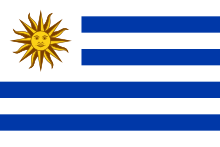
Uruguay, officially the Oriental Republic of Uruguay, is a country in South America. It shares borders with Argentina to its west and southwest and Brazil to its north and northeast, while bordering the Río de la Plata to the south and the Atlantic ocean to the southeast. It is part of the Southern Cone region of South America. Uruguay covers an area of approximately 176,215 square kilometres (68,037 sq mi) and has a population of around 3.4 million, of whom nearly 2 million live in the metropolitan area of its capital and largest city, Montevideo.

This article deals with the diplomatic affairs, foreign policy and international relations of Uruguay. At the political level, these matters are officially handled by the Ministry of Foreign Relations, also known as Cancillería, which answers to the President.

Montevideo is the capital and largest city of Uruguay. According to the 2011 census, the city proper has a population of 1,319,108 in an area of 201 square kilometers (78 sq mi). Montevideo is situated on the southern coast of the country, on the northeastern bank of the Río de la Plata.

The 1930 FIFA World Cup was the inaugural FIFA World Cup, the world championship for men's national football teams. It took place in Uruguay from 13 to 30 July 1930. FIFA, football's international governing body, selected Uruguay as the host nation, as the country would be celebrating the centenary of its first constitution and the Uruguay national football team had successfully retained their football title at the 1928 Summer Olympics. All matches were played in the Uruguayan capital, Montevideo, the majority at the Estadio Centenario, which was built for the tournament.
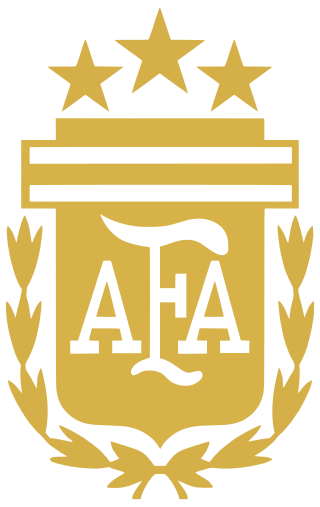
The Argentina national football team represents Argentina in men's international football and is administered by the Argentine Football Association, the governing body for football in Argentina.
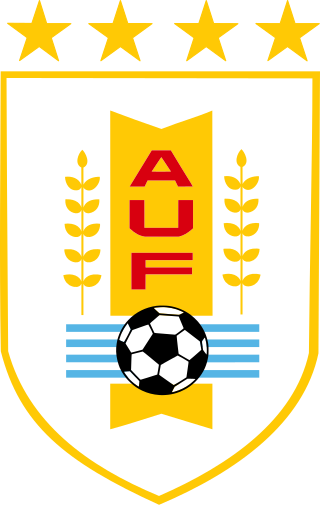
The Uruguay national football team represents Uruguay in international men's football, and is controlled by the Uruguayan Football Association, the governing body for football in Uruguay. The national team is commonly referred to as La Celeste.

Rivera is the capital of Rivera Department of Uruguay. The border with Brazil joins it with the Brazilian city of Santana do Livramento, which is only a block away from it, at the north end of Route 5. Together, they form an urban area of around 200,000 inhabitants. As of the census of 2011, it is the sixth most populated city of Uruguay.

The Uruguay national rugby union team, nicknamed Los Teros, represents the Uruguayan Rugby Union in men's international rugby union. One of the older test sides in the world, Uruguay has qualified five times for the Rugby World Cup, in 1999, 2003, 2015, 2019 and most recently 2023. As of 10 July 2023 they are ranked 17th in the world, and are ranked 2nd in the Americas region, behind rivals Argentina.
The Uruguayan Football Association is the governing body of football in Uruguay. It was founded in 1900, as The Uruguayan Association Football League, and affiliated to FIFA in 1923. It is a founding member of CONMEBOL and is in charge of the national men's team and the national women's team, as well as the Uruguayan football league system.

Santana do Livramento, also spelled Sant'Ana do Livramento, is a city in the state of Rio Grande do Sul, Brazil. It is located along the border with the city of Rivera, Uruguay, forming together an international city of almost 170,000 inhabitants. Santana do Livramento was founded on July 30, 1823, and in 1857 was emancipated from Alegrete as a city. In 2009, the city was officially declared by the Brazilian government as the symbolic city of Brazilian integration with the Mercosur member states.

Luis Alberto Suárez Díaz is a Uruguayan professional footballer who plays as a striker for Major League Soccer club Inter Miami and the Uruguay national team. Nicknamed "El Pistolero", he is regarded as one of the best players of his generation and one of the greatest strikers of all time. Individually, he has won two European Golden Shoes, an Eredivisie Golden Boot, a Premier League Golden Boot and a Pichichi Trophy. He has scored over 500 career goals for club and country.
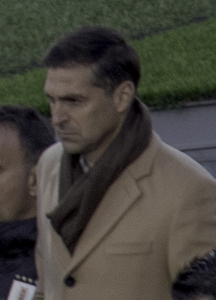
Diego Martín Alonso López is a Uruguayan professional football manager and former player who played as a striker.
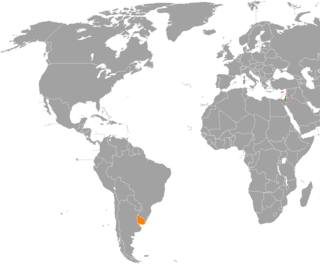
Israel–Uruguay relations are foreign relations between Israel and Uruguay. Uruguay was the first South American country and the fourth in the world to recognize Israel.

Sebastián Coates Nion is a Uruguayan professional footballer who plays as a centre-back for Portuguese club Sporting CP, which he captains, and the Uruguay national team.

Uruguayans are people identified with the country of Uruguay, through citizenship or descent. Uruguay is home to people of different ethnic origins. As a result, many Uruguayans do not equate their nationality with ethnicity, but with citizenship and their allegiance to Uruguay. Colloquially, primarily among other Spanish-speaking Latin American nations, Uruguayans are also referred to as "orientals [as in Easterners]".

The history of the Jews in Uruguay dates back to the colonial empire. The most important influx of Jewish population occurred during the end of the 19th century and the first half of the 20th century, mainly during the World War II.

Federico Santiago Valverde Dipetta is a Uruguayan professional footballer who plays as a central-midfielder for La Liga club Real Madrid and the Uruguay national team. Known for his pace, stamina, work rate and shooting ability, he is regarded as one of the best midfielders in the world. Mainly a central-midfielder, he is also able to deploy as a defensive-midfielder, a right-winger and occasionally a right-back.

The Supercopa Uruguaya is an annual one-match football official competition in Uruguay organised by the Uruguayan Football Association (AUF) which is played between the Primera División champions and the Torneo Intermedio winners of the previous season, starting from 2018. This competition serves as the season curtain-raiser and is scheduled to be played in late January or early February each year, one week before the start of the season.

Darwin Gabriel Núñez Ribeiro is a Uruguayan professional footballer who plays as a forward for Premier League club Liverpool and the Uruguay national team.
